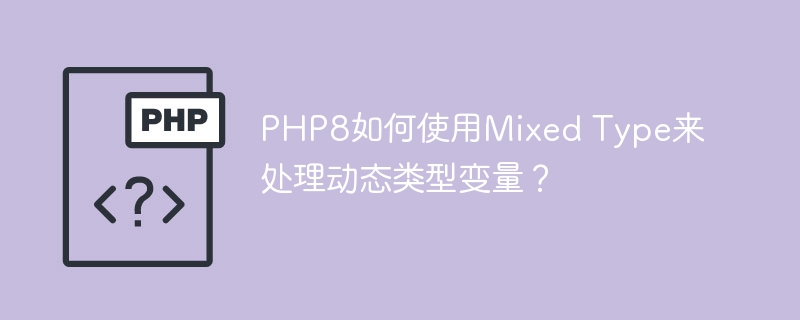Home >Backend Development >PHP8 >How does PHP8 use Mixed Type to handle dynamic type variables?
How does PHP8 use Mixed Type to handle dynamic type variables?
- WBOYWBOYWBOYWBOYWBOYWBOYWBOYWBOYWBOYWBOYWBOYWBOYWBOriginal
- 2023-10-20 09:41:15978browse

How does PHP8 use Mixed Type to handle dynamic type variables?
Overview:
In past PHP versions, the type of variables was relatively flexible and could be changed at will. This brings flexibility to developers, but also leads to type safety issues. PHP8 introduces Mixed Type, which provides a new way to handle dynamic type variables to achieve better type safety. Mixed Type is a special type that can receive variables of any type. Its flexibility allows developers to operate without losing type information.
Using Mixed Type:
In PHP8, Mixed Type can accept variables of any type, including basic data types, objects, arrays, etc. It can be used for function parameters, return values, properties and local variables, etc. By using Mixed Type, developers can avoid errors when they are unsure of the type of a variable.
The following is some sample code using Mixed Type:
Example 1: Function parameters
function add($a, mixed $b): mixed {
return $a + $b;
}
echo add(5, "10"); // 输出 15
echo add(5, 10); // 输出 15
echo add("5", 10); // 输出 15In the above example, the second parameter of the add function uses Mixed Type. No matter what type of parameter is passed in, it can be executed normally. In this example, we can pass parameters of type string or integer and the function will perform the operation correctly.
Example 2: Function return value
function divide(float $a, float $b): mixed {
if ($b == 0) {
return "除数不能为零";
}
return $a / $b;
}
echo divide(10, 5); // 输出 2
echo divide(10, 0); // 输出 "除数不能为零"
echo divide("10", "5"); // 输出 2In the above example, the return value type of the divide function is Mixed Type. If the divisor is 0, the function returns a string type error message, otherwise it returns the result of the division operation. By using Mixed Type, we can maintain type safety when returning values of different types.
Example 3: Properties and local variables
class Example {
public mixed $data;
private mixed $cache;
public function getData(): mixed {
return $this->data;
}
public function processData(): void {
$this->cache = $this->data;
var_dump($this->cache);
}
}
$example = new Example();
$example->data = 10;
$example->processData();
// 输出 int(10)
$example->data = "Hello";
$example->processData();
// 输出 string(5) "Hello"In the above example, the $data and $cache properties in the Example class both use Mixed Type. The $data attribute can store any type of data, and the $cache attribute is used to temporarily store the value of the $data attribute. In the processData method, we assign the value of the $data attribute to the $cache attribute and use var_dump to print the value of the $cache attribute. By using Mixed Type, we can easily handle different types of properties and local variables.
Summary:
PHP8 introduces Mixed Type as a solution for handling dynamic type variables. Mixed Type can accept variables of any type, allowing developers to operate without losing type information. By using Mixed Type, you can better handle variables of uncertain types and improve the reliability and security of your code. When writing code, developers should use Mixed Type reasonably according to the actual situation to avoid abuse or misuse.
The above is the detailed content of How does PHP8 use Mixed Type to handle dynamic type variables?. For more information, please follow other related articles on the PHP Chinese website!

